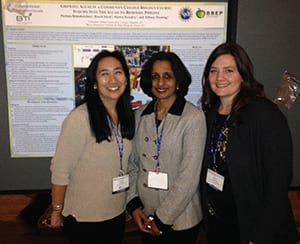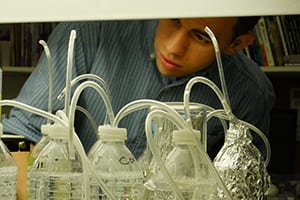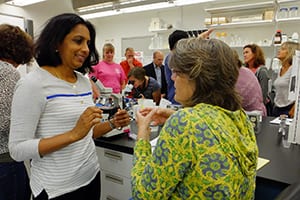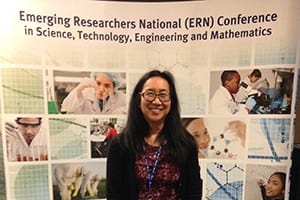News
BTI Teachers Present at Emerging Researchers National Conference

Teachers Karen Horikawa, Pushpa Ramakrishna, and BTI Director of Education Tiffany Fleming in front of their poster at the 2015 ERN Conference
Two attendees of BTI’s summer teacher workshops travelled to the 2015 Emerging Researchers National Conference in STEM to present their use of an algal photobioreactor laboratory, designed in BTI labs, for community college and middle school science classes.
Pushpa Ramakrishna, a professor of biology at Chandler Gilbert Community College in Arizona, and Karen Horikawa, a science teacher at Wilmington Friends School in Delaware, created their own specialized curricula using the photobioreactor project to teach community college and middle school students, respectively. The project teaches students basic concepts in green technology and methods of scientific inquiry.
BTI’s Director of Education and Outreach Tiffany Fleming and Education Specialist Shawn Kenaley design and teach the summer institutes and were co-presenters at the meeting. Syed Ather, a sophomore at Indiana University in Bloomington and a 2014 intern in Associate Professor Zhangjun Fei’s laboratory, presented his summer research project on the regulation of tomato fruit ripening. The conference took place in in Washington D.C. and was supported by the American Association for the Advancement of Science and the National Science Foundation.
“This was a unique national meeting,” said Fleming. “The intent of the Emerging Researchers National Conference is to celebrate, mentor and inspire undergraduate and graduate researchers from across the country, as well as the educators who teach them.”
The meeting pulls together researchers, science teachers and students of varying ages to help young researchers prepare to enter the global workforce and to acknowledge the importance of mentoring and interdisciplinary collaboration across STEM fields. At the meeting, BTI educators and interns had the opportunity to develop a greater awareness of the activities and aspirations of the national scientific research communities, said Fleming. “These are tremendous benefits and I expect BTI will have a greater presence at national STEM meetings going forward.”
Fleming leads BTI’s Bioenergy and Bioproducts Education Programs (BBEP). The five-day course provides materials and training for teachers to develop activities for students to develop scientific inquiry skills. In one activity students design algal photobioreactors based on their new understandings of algal growth requirements. Algae can transform carbon dioxide and water into fatty compounds that can then be converted into biodiesel. After the course, attendees of the program continue to receive classroom support and follow-up consultations with BTI educators through social media and classroom visits. A five-year grant from the USDA supports this project.
 Ramakrishna attended the 2014 BBEP and then tailored the workshop to a community college level for her honors biology course. Groups of students acted as scientific advisors to a biofuel startup company and determined the optimal growth conditions for the alga Chlorella protothecoides. Students had the opportunity to make hypotheses regarding which conditions would yield the best growth and to design experiments to test their ideas.
Ramakrishna attended the 2014 BBEP and then tailored the workshop to a community college level for her honors biology course. Groups of students acted as scientific advisors to a biofuel startup company and determined the optimal growth conditions for the alga Chlorella protothecoides. Students had the opportunity to make hypotheses regarding which conditions would yield the best growth and to design experiments to test their ideas.
“They really got into the laboratory activity,” said Ramakrishna. “They were brainstorming; they formulated questions, came up with alternative hypotheses, and then chose what they were going to test. The students gathered background information and designed their experiments. It was cool to see them in action.”
The students set up their photobioreactors to test how different types of sugar, the presence of salt or a range of fertilizer concentrations affected algal growth. Some students asked to test the effects of different colors of light, so Ramakrishna bought additional equipment so that students in her spring semester could also vary the wavelengths used by the algae.
“It’s a very good learning experience for students,” she said. “They truly get to act like scientists.”
Ramakrishna has always loved science and continues to look for new ways to share that enjoyment with her students. She grew up in Bangalore, India, where she earned a bachelors and a master’s degree in biochemistry from the University of Bangalore. After moving to the US, she earned a second master’s degree in molecular biology at Arizona State University and then became a biology professor at the community college where she has taught for more than 25 years. While teaching, she finished her doctorate in sustainability education at Arizona State.
“I’ve always been excited by the thought of how to care for the environment,” Ramakrishna said.
 She would like to continue her relationship with BTI and to develop new lab experiments for her courses. “It was an amazing experience,” she said.
She would like to continue her relationship with BTI and to develop new lab experiments for her courses. “It was an amazing experience,” she said.
The algal bioreactors lend themselves not just to community college courses but to middle school science classes as well. Karen Horikawa, a science teacher at Wilmington Friends School, an independent Quaker school in Delaware, first learned of the bioreactors while attending the Summer Teacher Institute for Curriculum Development Projects in Plant Biology at BTI in 2014. She customized the curriculum by incorporating it into an ecology unit and taught the project in her eighth-grade science class
The project has been a great fit for her classroom, she said, because it enables her students to approach the same problems that scientists are trying to solve to make algal biofuel a viable alternative to fossil fuel. She instructed her students to test out eight combinations of nutrients and light levels to find the optimal conditions for growing the algae. In the future, she hopes to collaborate with another class to compare differences between algal species.
By presenting a poster on this project at the conference, Horikawa wanted to spread the word that experimental science that addresses real-world problems can be taught at the middle school level, and perhaps even earlier.
“Connecting my class to real-world science is the ultimate goal,” she said. “It was very classroom friendly and it satisfied my desire to put more sustainability studies in my classroom.”
Horikawa selected the project, in part, because its focus on renewable resources dovetails with the Quaker school’s philosophy of environmental conservation and stewardship. Issues of science and the environment have long interested Horikawa. She studied biology and geology at Colgate University and began teaching immediately afterwards. She has taught middle school science for more than 20 years, spending the previous 16 years at Wilmington Friends School.
Horikawa plans to keep the project in her teaching schedule “as long as I can keep getting algae from BTI,” she laughs. “I’m just really grateful for all the help I’ve gotten from Tiffany and Shawn.”
With support from the National Science Foundation, Fleming is now developing new curriculum materials that integrate current algal biofuels research from the laboratories of BTI President David Stern and Arum Han, a researcher at Texas A&M University in College Station.
The Curriculum Development Projects in Plant Biology course will be held July 13-17 and the 2015 Bioenergy and Bioproducts Education Program will occur July 27-30. Interested teachers can apply to attend the institutes on the BTI website until March 15.


